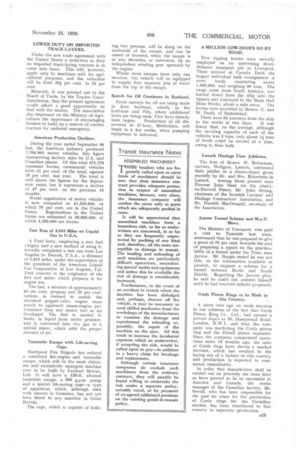LOWER DUTY ON IMPORTED TRACK-LAYERS.
Page 29

If you've noticed an error in this article please click here to report it so we can fix it.
Under the new trade agreement with the United States a reduction in duty on imported track-laying tractors is to come into force. This will, however, apply only to machines sold for agricultural purposes, and the reduction will be from 33i per cent. to 25 per cent.
Recently, it was pointed out to the Board of Trade, by the Tractor Users' Association, that the present agreement would afford a good opportunity to deal with the matter. The Association also impressed on the Ministry of Agriculture the importance of encouraging farmers to build up a reserve of crawler tractors for national emergency.
American Production Declines.
During the year ended September .30 last, the American industry produced 2,704.992 motor vehicles, this figure representing factory sales by U.S. and Canadian plants. Of this total 574,778 represent lorries; commercial vehicles form 21 per cent. of the total, against 18 per cent, last year. The total is well above the figures for the depression years, but it represents a decline of 47 per cent, on the previous 12 months.
World registration of motor vehicles is now computed at 41,500,000, of which 70 per cent. are in the United States. Registrations in the United States are estimated at 28,800,000, of which 4,200,000 are lorries.
Test Run of 2,815 Miles on Liquid Gas in U.S.A.
A Ford lorry, employing a new fuel (Algas) and a new method of using it. recently completed a test run from Los Angeles to Detroit, U.S.A., a distance of 2,815 miles, under the supervision of the president of the American Liquid Gas Corporation of Los Angeles, Cal. That concern is the originator of the fuel and mixer which prepares it for engine use.
The fuel, a mixture of approximately 65 per cent. propane and 35 per cent, butane, is claimed to enable the standard poppet-valve engine more nearly to approach steam-engine performance than any motor fuel so far developed. The fuel is carried in tanks, in liquid form under pressure, and is converted into dry gas in a special mixer, which adds the proper amount of air.
Turntable Escape with Life-saving Cage.
Blackpool Fire Brigade has ordered a combined fire-engine and turntable escape, which will be the most elaborate and extensively equipped machine ever to be built by Leyland Motors, Ltd. It will have a 120-ft. all-steel turntable escape, a 500 g.p.m. pump and a special life-saving cage—a type of apparatus, which, although used with success in Germany, has not yet been fitted to any machine in Great Britain.
The cage, which is capable of hold
ing two persons, will be slung on the underside of the escape, and can be raised or lowered, when the escape is at any elevation or extension, by an independent winding gear operated by the engine.
Whilst most escapes have only one monitor, this vehicle will be equipped to supply four separate jets of watei from the top of the escape.
Search for Oil Continues in Scotland.
Fresh surveys for oil are being made in East Scotland, chiefly in the Lothians and Fife, where additional bores are being sunk. Five have already
been begun. Production of oil discovered at D'Arcy, Midlothian, will begin in a few weeks, when pumping equipment is delivered.
A MILLION COW-HOOFS GO BY ROAD.
Five tipping lorries were recently employed on an interesting shortdistance transport job at Liverpool. There arrived at Canada Dock the largest individual bulk consignment if cows' hoofs, numbering about 1,000,000, and weighing 90 tons. The cargo came from South America, was loaded direct from the ship into the tippers and conveyed to the Bank Hail Bone Works; about a mile away. The lorries were provided by Messrs. G. and W. Dodd, of Birkenhead.
There were 63 journeys from the ship
to the works in two days. It was found that, on the average, although the carrying capacity of each of the vehicles was 5 tons, only about 4 tons of hoofs could be carried at a time, owing to their bulk.
Lanark Haulage Firm Jubilates.
The firm of Messrs. W. Robertson, carriers, Wellgate. Lanark, celebrated their jubilee at a dinner-dance given recently by Mr. and Mrs. Robertson in Lanark. Among those present were Provost John Steel (in the chair), ex-Provost Paton, Mr. John Strang, chairman of the Scottish Carriers' and Haulage Contractors' Association, and Mr. Hamish MacDougall, secretary of the Association.
Jarrow Tunnel Scheme and M.o.T.
Move.
The Minister of Transport, who paid a visit to Tyneside last week, announced that he was prepared to give a grant of 75 per cent, towards the cost. of preparing a report on the practicability of a tunnel under the Tyne, near Jarrow. Mr, Burgin stated he was not able, on the information available at present, to support a scheme for a tunnel between North and South Shields. Regarding the Jarrow plan, he said he could not commit himself until he had received definite proposals.
Cords Piston Rings to be Made in this Country.
A short time ago we made mention in our columns of the fact that Cords Piston Ring Co., Ltd., had opened a service depot at 30, Hampstead Road, London, N.W.1, and that the company was marketing the Cords piston ring and the Fitzall piston expander. Since the company commenced operations some 14 months ago, the sales of Cords rings have shown a marked increase, which has resulted in the laying out of a factory in this country and production is expected to commence immediately.
In order that manufacture shall be carried out on precisely the same lines as have proved to be so successful in America and Canada, the works manager of the Canadian factory, Mr. Sewell, who has been responsible for the past six years for the production of Cords rings for the Canadian market, has been transferred to this country to supervise production.




















































































